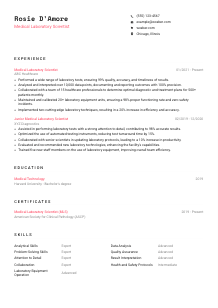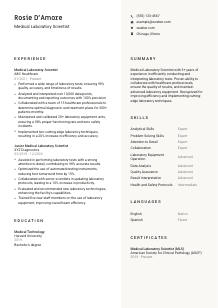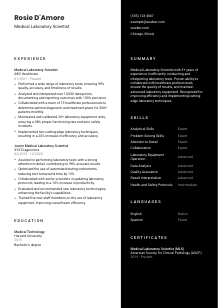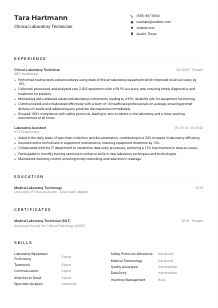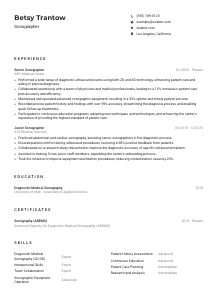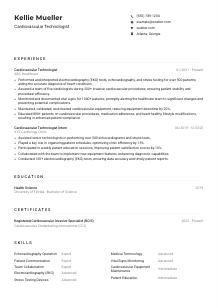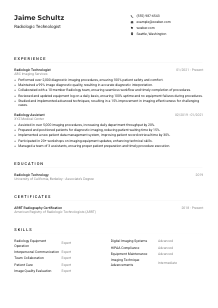Medical Laboratory Scientist Resume Example
Unraveling cell mysteries, but your resume feels microscopic? Peer through this Medical Laboratory Scientist resume example, amplified using Wozber free resume builder. Discover how to showcase your scientific finesse to align with job specifics, ensuring your career profile shines under the clinical microscope!
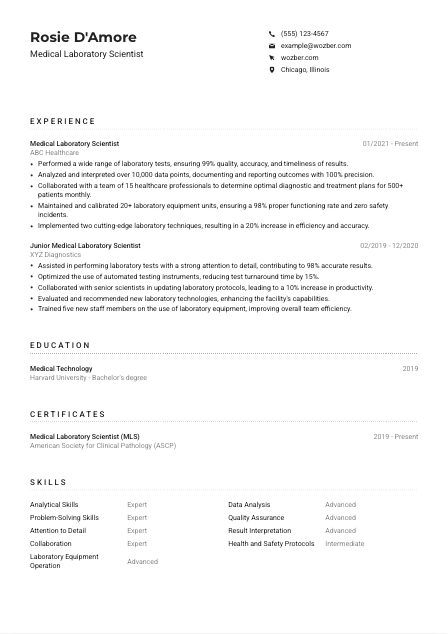
How to write a Medical Laboratory Scientist Resume?
Hello, aspiring Medical Laboratory Scientist! If you're on the precipice of applying for your dream role and want your resume to not only pass the ATS scan but also stand out to the hiring manager, you're in the right place. Using Wozber's free resume builder, this detailed guide will walk you through tailoring your resume specifically to the Medical Laboratory Scientist position, highlighting how to shine a light on your skills and experience in a way that speaks directly to your future employer's needs. Let's get started on transforming your resume into a document that opens doors.
Personal Details
The Personal Details section is the first impression you make. It's brief but vital. Let's perfect this section for a Medical Laboratory Scientist position, ensuring it ticks all the boxes for specificity, relevance, and ATS compliance.
1. Name and Title
Your name should leap off the page - clear and bold. Immediately below, specify your professional title, exactly as it appears in the job description: 'Medical Laboratory Scientist'. This sets a professional tone and tailors your resume right from the start.
2. Contact Details
Include your phone number and a professional email address. A common format is firstname.lastname@email.com, which helps maintain a professional image. Double-check these for accuracy; you wouldn't want a typo to be the reason you miss an important call or email.
3. Location Matters
Given that the job requires being located in Chicago, Illinois, mentioning your city and state upfront meets this requirement head-on. It assures the employer of your availability without them having to fish for this information.
4. Online Presence
Linking to a professional online profile like LinkedIn can dramatically boost your credibility. Ensure it's polished and mirrors your resume's information. This can provide a deeper insight into your professional background and achievements.
5. Privacy and Conciseness
Skip any personal details that aren't relevant to your application, such as marital status or photo. In the digital age, protecting your privacy and focusing on professional qualifications is key.
Takeaway
This section is more than mere formalities; it's an opportunity to immediately show fit and readiness for the role. With each detail, you're reinforcing your professionalism and attention to the criteria laid out in the job listing.





Experience
The Experience section is where you prove your worth. For a Medical Laboratory Scientist role, focusing on pertinent accomplishments and skills is crucial. Let's ensure this section of your resume speaks volumes about your capability and dedication.
- Performed a wide range of laboratory tests, ensuring 99% quality, accuracy, and timeliness of results.
- Analyzed and interpreted over 10,000 data points, documenting and reporting outcomes with 100% precision.
- Collaborated with a team of 15 healthcare professionals to determine optimal diagnostic and treatment plans for 500+ patients monthly.
- Maintained and calibrated 20+ laboratory equipment units, ensuring a 98% proper functioning rate and zero safety incidents.
- Implemented two cutting‑edge laboratory techniques, resulting in a 20% increase in efficiency and accuracy.
- Assisted in performing laboratory tests with a strong attention to detail, contributing to 98% accurate results.
- Optimized the use of automated testing instruments, reducing test turnaround time by 15%.
- Collaborated with senior scientists in updating laboratory protocols, leading to a 10% increase in productivity.
- Evaluated and recommended new laboratory technologies, enhancing the facility's capabilities.
- Trained five new staff members on the use of laboratory equipment, improving overall team efficiency.
1. Match the Job Requirements
Align your previous job roles with the responsibilities and requirements of the Medical Laboratory Scientist position. This will involve tailoring each bullet point to reflect experiences that resonate with performing a wide range of laboratory tests and analyzing laboratory data, as specified in the job description.
2. Present Your Roles Clearly
Structure your experience in a reverse chronological order, showcasing your most recent and relevant roles first. Clearly list your job title, the name of your employer, and the dates of your employment to give hiring managers a clear timeline of your professional journey.
3. Highlight Key Accomplishments
Use action verbs to make your accomplishments pop. For example, "Performed over 10,000 data analyses, documenting and reporting outcomes with 100% precision." This not only shows what you've achieved but how you stand out in your profession.
4. Quantify Your Impact
Whenever possible, include numbers to quantify your impact. Bringing in statistics like "Ensured 99% quality, accuracy, and timeliness of results" provides tangible evidence of your contributions and capabilities.
5. Relevance is Key
Keep your experience focused on tasks and accomplishments that directly align with the responsibilities of a Medical Laboratory Scientist. While it might be tempting to include all your professional experiences, relevance wins over quantity.
Takeaway
Your experience section should be a testament to your ability to fulfill the role's requirements with excellence. Tailor each point to reflect your achievements and how they align with the job, underlining your suitability for the position.
Education
In the world of Medical Laboratory Science, your educational foundation is pivotal. It's not just about the degrees you've earned but how they align with the job's demands. Let's refine your education section to highlight its relevance to the position you're applying for.
1. Meet the Degree Requirements
The job description asks for a Bachelor's degree in Medical Technology or a related field. Make sure this is clearly stated in your education section. Listing the exact name of your degree verifies that you meet the basic educational criteria.
2. Lay It out Clearly
Organize your education details in a straightforward manner: degree, field of study, institution, and graduation date. This clarity makes it easy for hiring managers to quickly confirm your qualifications.
3. Degree Specificity
Since the job emphasizes a specific field of study, ensure your degree and field align closely with it. Using the exact language from the job description can help your resume pass ATS scans and catch the hiring manager's eye.
4. Coursework and Projects
Where relevant, mention key courses or projects that have equipped you with skills directly applicable to the Medical Laboratory Scientist role. While not always necessary, this can be particularly useful for recent graduates.
5. Additional Achievements
If you have any notable academic achievements or extracurricular activities related to medical technology, it's worth mentioning them. However, gauge their relevance based on your level of experience and the position you're applying for.
Takeaway
Your education section is more than a checklist. It's a narrative of your academic journey, showing a direct path to the role you're aspiring for. Highlight the aspects of your education that make you an ideal candidate for the Medical Laboratory Scientist position.
Certificates
In the evolving field of medical laboratory science, staying abreast of the latest advancements through certifications is crucial. Here's how to effectively showcase your certifications, ensuring they bolster your application for the Medical Laboratory Scientist position.
1. Address the Non-negotiables
The job description mentions a specific requirement: Certification as a Medical Laboratory Scientist (MLS) from ASCP or equivalent. Highlight this certification prominently in your resume to meet one of the critical criteria.
2. Quality Over Quantity
While you may hold multiple certifications, prioritize those most relevant to the role. This ensures that your resume remains focused and resonates more strongly with the specific demands of the position you're seeking.
3. Current and Relevant
Make sure to include valid dates for your certifications, especially if they have expiration dates. This demonstrates your commitment to maintaining your status and staying updated in your field.
4. Never Stop Learning
Show a dedication to continuous learning by keeping your certifications up to date and seeking out new ones relevant to advancements in medical laboratory science. This dedication can make you a more appealing candidate.
Takeaway
Your certifications are the hard evidence of your skills and dedication to your profession. Prioritize relevance and currency, ensuring that your resume reflects an ongoing commitment to excellence in medical laboratory science.
Skills
Your skills section is your chance to succinctly showcase your professional capabilities to the hiring manager. For a Medical Laboratory Scientist, it's about striking a balance between technical know-how and the soft skills that enable collaborative, detail-oriented work.
1. Pinpoint Your Strongest Skills
Extract key skills directly from the job description, such as 'Strong analytical and problem-solving skills, with attention to detail,' and 'Proficiency with various laboratory equipment.' These are the skills you want to highlight front and center.
2. The Perfect Mix
Balance your list with both hard skills, like 'Laboratory Equipment Operation' and 'Data Analysis,' and soft skills, such as 'Analytical Skills' and 'Collaboration.' This mix shows you're well-rounded, capable both technically and in team environments.
3. Precision and Clarity
Resist the urge to list every skill you've ever acquired. Instead, prioritize those most relevant to the job description. This targeted approach makes for a more compelling read and shows your alignment with the job's needs.
Takeaway
Your skills section is a powerful, concise statement of what you bring to the table. Carefully selecting skills that mirror the job requirements shows you're not just a candidate - you're the right candidate for the role.
Languages
In the increasingly global environment of healthcare, linguistic abilities can significantly enhance your appeal as a candidate. Even if the job description doesn't prioritize languages, showcasing your multilingual skills can offer a competitive edge.
1. Mandatory Language Skills
The job description specifies "English language skills are mandatory." Ensure you list English as either 'Native' or 'Fluent' to meet this essential requirement, establishing your ability to communicate effectively in the workplace.
2. Additional Languages
If you're fluent in additional languages, list them. This could be particularly advantageous in environments where you're dealing with a diverse population or reports and literature in other languages.
3. Level of Proficiency
Be honest about your level of language proficiency, categorizing them as 'Native,' 'Fluent,' 'Intermediate,' or 'Basic.' This transparency helps set realistic expectations and showcases your integrity.
4. Every Language Counts
Even if you think a language might not be directly relevant, list it. Diverse language skills can reflect well on your adaptability and readiness to engage in varied settings.
5. Context and Relevance
Consider the broader context of the role. In a city like Chicago, known for its diverse population, being bilingual or multilingual could significantly enhance your ability to connect with patients and colleagues from various backgrounds.
Takeaway
Your ability to speak multiple languages is a testament to your adaptability and cultural competence, traits highly valued in the healthcare industry. Highlighting this skill set, even if not explicitly required, can only strengthen your application.
Summary
The summary section is your moment to shine in narrative form. Here, you encapsulate your professional identity, match it with the job's needs, and set the tone for your resume. Let's make it resonate with your ambition to become a Medical Laboratory Scientist.
1. Capture the Role's Essence
Begin by solidifying your understanding of the job description. What key skills and experiences are highlighted for a Medical Laboratory Scientist? This will form the backbone of your summary.
2. Start Strong
Introduce yourself with a statement that brings together your experience and expertise. For instance, 'Medical Laboratory Scientist with 3+ years of experience in conducting and interpreting laboratory tests with high accuracy and efficiency.'
3. Address Must-Haves
Pinpoint crucial requirements from the job description, such as proficiency in laboratory equipment and analytical skills, and weave these into your summary. Demonstrating your strengths in these areas underscores your suitability.
4. Be Concise Yet Impactful
Keep your summary to 3-5 lines, enough to spark interest but leaving room for details in the sections that follow. Each word should contribute to an overall impression of capability and readiness for the challenges of the role.
Takeaway
Your summary isn't just an introduction; it's a compelling preview of what you offer. Tailor it to reflect your understanding and enthusiasm for the Medical Laboratory Scientist position, setting the stage for a resume that aligns perfectly with the job's demands.
Launching Your Medical Laboratory Scientist Journey
Congratulations, you've navigated through the nuances of crafting a targeted, ATS-compliant resume for a Medical Laboratory Scientist role. By engaging with this guide and applying these strategies using Wozber's free resume builder, you're not just preparing a resume; you're strategizing for your career's next big leap. Remember, your resume is a dynamic document that should evolve with your experiences, achievements, and the roles you seek.
With Wozber's ATS-friendly resume templates and ATS resume scanner, you're equipped to make each application count. Go ahead, submit your application with confidence, and take one step closer to your dream role.

- Bachelor's degree in Medical Technology or related field.
- Certification as a Medical Laboratory Scientist (MLS) from the American Society for Clinical Pathology (ASCP) or equivalent.
- Minimum of 2 years of experience working in a clinical laboratory setting.
- Proficiency with various laboratory equipment, including automated testing instruments.
- Strong analytical and problem-solving skills, with attention to detail.
- English language skills are mandatory for this position.
- Must be located in Chicago, Illinois.
- Perform a wide range of laboratory tests, ensuring quality, accuracy, and timeliness of results.
- Analyze and interpret laboratory data, documenting and reporting results accurately.
- Collaborate with healthcare professionals to determine the best diagnostic and treatment plans for patients.
- Maintain and calibrate laboratory equipment, ensuring proper functioning and safety.
- Stay updated with the latest advances in laboratory techniques and technologies, and implement them as appropriate.





